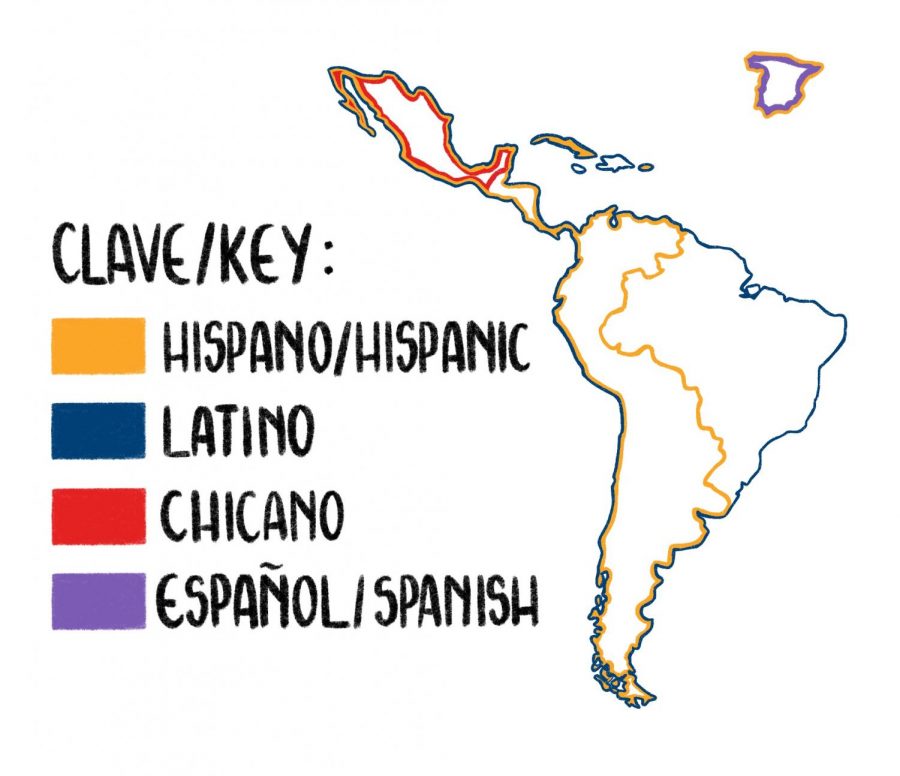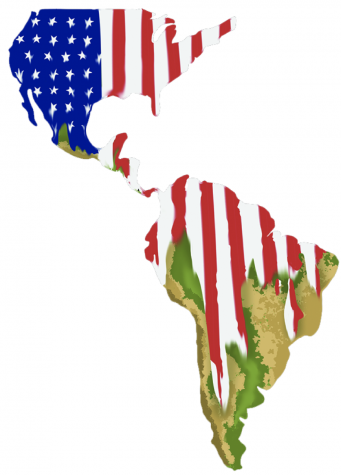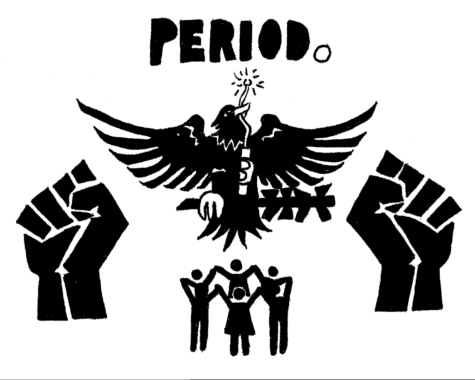What it all means: Latino vs Hispanic vs Chicano
Even though there are similarities, Latino, Hispanic and Chicano have different meanings. Read more below.
During Hispanic Heritage Month, the staff members of Lincoln’s Spanish magazine, Puño Y Letra, wrote about why it’s important to distinguish between Latino, Hispanic and Chicano heritage. Read the article below, and scroll down for an English translation.
For more Puño Y Letra content, click here.
Latino, hispano, chicano, todas son palabras confusas que básicamente significan lo mismo, ¿verdad? ¡NO! Aunque tengan similitudes, estas tres palabras tienen significados distintos. A veces sí se pueden usar todas las palabras para describir a alguien, a veces solo dos o una, y a veces ninguna. Todo depende de la tierra natal del sujeto en cuenta y sus preferencias. Déjenme informarles sobre cuándo se puede usar estas palabras y cuándo no.
La palabra “latino” se refiere, en Norteamérica, a alguien de ascendencia u origen latinoamericana. En otras palabras, alguien nacido en México, Centro o Sudamérica, o partes del Caribe, o con familia de estos países puede ser considerado latino. Esta palabra fue creada en 1947 como manera más breve de decir “latinoamericano”. “Latino” no se refiere a la lengua hablada en tu país natal, sino a la ubicación geográfica del país. Por esto es que esta palabra tiene connotaciones culturales y representa una etnicidad, no una raza. Por el hecho de que Brasil está ubicado en Latinoamérica y no tiene al español como su lengua mayormente hablada, los brasileños son considerados latinos y no hispanos.
La palabra “hispano” se refiere, en Norteamérica, a alguien nacido en o con ascendencia a países hispanohablantes sin importar su raza. En otras palabras, la gente nacida en o con familiares de México, Centroamérica, Sudamérica y España son considerados hispanos, con excepciones que incluyen a Brasil y Belice porque sus lenguas principales no son el español. No igual que la palabra “latino”, “hispano” se refiere simplemente al idioma primario de tu país natal o de tu familia, y no necesariamente su cultura o ubicación geográfica. Tampoco significa lo mismo que “español”, lo cual se refiere a gente solo de España. Tengan en mente que confundir estos términos puede ser ofensivo ya que los países hispanohablantes tuvieron que luchar por su independencia de España, sus colonizadores. Por culpa de estereotipos y prejuicios, la palabra lleva connotaciones de trabajadores inmigrantes que trabajan en el fíl (el campo), cortan pasto o limpian baños, y es importante que nos liberemos de esta mentalidad.
Aunque las palabras “latino” e “hispano” se refieren a gente de múltiples países, “chicano” es más específico. La palabra “chicano” se refiere, en Norteamérica, a alguien de origen o ascendencia mexicana. La palabra “chicano” fue creada en los 60 ‘s por gente blanca y de otras razas para degradar a los Mexicanos y etiquetarlos como una clase social menor a los demás. Después, este término fue adoptado por los mexicanos americanos de estatus económico elevado para degradar a sus paisanos de estatus económico más bajo. Finalmente, el término fue adoptado por Cesar Chavez y sus seguidores para unificar y apoderar a los mexicanos americanos durante el Movimiento Chicano. Por eso, aunque un Mexicano se puede considerar latino o hispano, muchos deciden usar el término “chicano” para mejor expresar su conexión a su país natal y para honrar el Movimiento Chicano.
Latino, hispano y chicano no significan lo mismo, son términos similares que se usan para representar a gente de países en Latinoamérica y a veces España. Recientemente, se le ha agregado una “x” como sufijo para reemplazar la “o” masculina y la “a” femenina en un esfuerzo de ser más inclusivo de todos los géneros, así que esto puede ser una opción cuando eliges un término para usar. Los tres términos tienen origen negativo después de haber sido creados por gente blanca de forma degradante, pero eso no quiere decir de que se deben usar así. También es importante notar que estos no son términos universales con solo un uso correcto o incorrecto, porque no todos están perfectamente representados por uno solo. El sujeto en cuenta tiene todo el derecho de decidir cuál creen que lo mejor representan, aunque no siga la definición estricta en el diccionario completamente. Aunque latino, chicano e hispano no son palabras perfectas hechas con cariño, es importante saber sus significados y usarlas de forma positiva.
IN ENGLISH:
Latino, Hispanic, Chicano. All words that can be confusing and that basically mean the same thing, right? NO! Even though there are similarities, these three words have different meanings. Sometimes, yes, all three words can be used to describe one person, but other times only one or two of them can be used, and sometimes none of them. It all depends on the relevant subject’s native land and their preferences. Let me inform you about when these words can be used and when they can not.
The word “Latino” refers, in North America, to someone of Latin American ancestry or origin. In other words, someone born in Mexico, Central or South America, or parts of the Caribbean or someone with family from these countries can be considered Latino. This word was created in 1947 as a shorter way to say “Latin American”. “Latino” does not refer to the spoken language in your country of birth, but rather the geographic location of the country. Because of this, the word has cultural connotations and represents an ethnicity, not a race. Since Brazil is located in Latin America and does not have Spanish as its principle language, Brazilians are considered Latinos and not Hispanic.
The word “Hispanic” refers, in North America, to someone who was born in, or is of ancestry from, a Spanish-speaking country, regardless of racial background. Put differently, people born in or who have family from Mexico, Central America, South America, and Spain are considered Hispanic, with exceptions including Brazil and Belize where the primary language is not Spanish. In contrast to the word “Latino”, “Hispanic” simply refers to the primary language of your country of birth, or that of your family, and does not necessarily relate to culture or geographical location. It also does not mean the same thing as calling a person “Spanish,” a word that refers to people from Spain. Keep in mind that confusing these two terms can be offensive as Spanish-speaking countries had to fight for their independence from Spain, their colonizer. Because of certain stereotypes and prejudices, the word carries connotations of immigrant people who work in fields, mow lawns or clean bathrooms, and it is important that we break free of this mindset.
Although the words “Latino” and “Hispanic” refer to people of many countries, “Chicano” is more specific. The word “Chicano” refers, in North America, to someone of Mexican origin or ancestry. The word “Chicano” was created in the 60s by white people and people of other races to degrade Mexicans and label them as a low social class. Later on, this term was adopted by Mexican Americans of high economic status to degrade people from the same country but of lower economic status. Finally, the term was adopted by Cesar Chavez and his followers to unite and empower Mexican Americans during the Chicano Movement. This has made it so that even though a Mexican person can be considered Latino or Hispanic, many decide to use the term “Chicano” to better express their connection to their birthplace and to honor the Chicano Movement.
Latino, Hispanic, and Chicano do not mean the same thing, they are similar terms that are used to represent people from Latin American countries and, sometimes, Spain. Recently, an “x” has been added as a suffix to replace the masculine “o” and feminine “a” in an effort to be more gender-inclusive, so this is an option when choosing a term to use. The three terms have negative origins as they were created by white people as a form of oppression, but that does not mean that they should continue being used that way. It is also important to note that these are not universal terms with one correct or incorrect use, because not everyone is perfectly represented by just one label. The person choosing which term(s) to go by has the right to decide which they feel better represented by, even if it means not following the strict dictionary definitions precisely. Even though Latino, Hispanic, and Chicano are not perfect words created from a place of love, it is important to know their meanings and use them in a positive manner.









Ryan Ward Valverde • May 17, 2023 at 9:46 am
No estoy de acuerdo con la terminología propuesta en este artículo sobre la definición de la palabra “hispano”. Al menos entre la gente nacida en Nuevo México, se considera “hispano” a aquel que nació aquí con ascendencia de los colonizadores que provinieron de España, pero sin raíces en ninguna parte de lo que hoy es México.